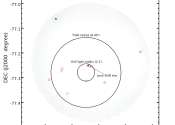3 scientists win Nobel physics prize for black hole research
Three scientists won the Nobel Prize in physics Tuesday for establishing the all-too-weird reality of black holes—the straight-out-of-science-fiction cosmic monsters that suck up light and time and will eventually swallow ...









